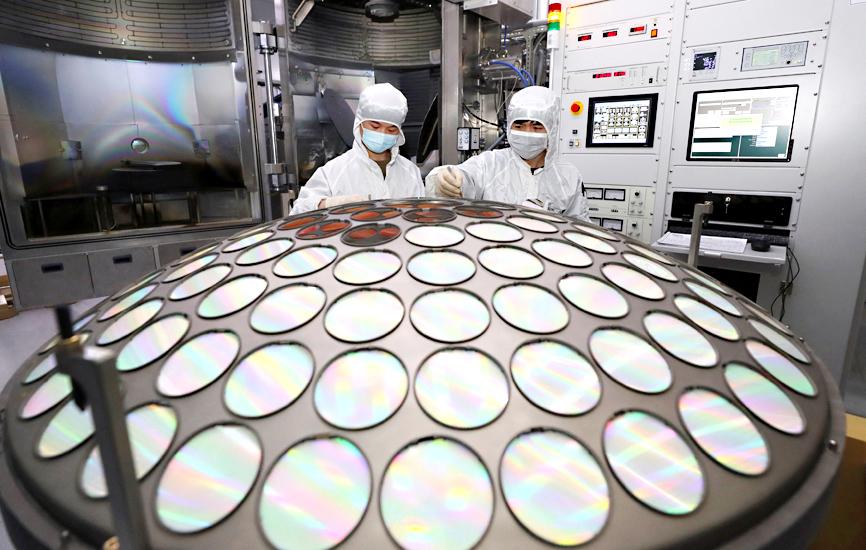The indefinite closure of 3M Co’s semiconductor coolant plant in Belgium could have major effects on the global semiconductor industry, in which Taiwan has a leading role, analysts said on Sunday.
The 3M plant in Zwijndrecht closed on March 8 due to tightened environmental regulations, a report on Friday in BusinessKorea magazine said.
Coolant prices have been rising since early this year due to high demand, and the Zwijndrecht plant reportedly accounted for 80 percent of global semiconductor coolant output, analysts said.

Photo: Reuters
3M on March 18 sent an official notice to its clients including Samsung Electronics Co, SK Hynix Inc, Intel Corp and Taiwan Semiconductor Manufacturing Co (台積電), the magazine said.
Citing industry sources, the magazine said that 3M’s customers could manage for one to three months with their current coolant inventories, which are essential for semiconductor etching.
Unless the situation is resolved, the global semiconductor manufacturing sector is likely to be significantly affected, the report said.
BusinessKorea said the Belgian government’s regulations were related to the emission of perfluoroalkyl and polyfluoroalkyl substances (PFAS), known for their nonstick and water-resistant properties and which have long been used in products from fabric protectors to firefighting foam.
PFAS, a controversial class of chemicals that 3M pioneered decades ago, has been linked to significant health risks, including certain types of cancer, according to news reports.
Separately, Spain plans to invest 11 billion euros (US$12.1 billion) to develop microchips and semiconductors as part of a series of strategic projects to overhaul its economy, Spanish Prime Minister Pedro Sanchez said.
“We want our country to be at the vanguard of industrial and technology progress,” Sanchez said yesterday in Madrid, without giving more details.
Sanchez said the project would soon be approved by his Cabinet.
Policymakers across Europe are racing to enact plans to invest in chips and cut reliance on imported technology. The EU aims to become a key semiconductor manufacturer with a goal of producing 20 percent of the world’s chip supply by 2030. The commission also freed up public funding for the production of chips considered “first of a kind” in Europe with its 45 billion euro Chips Act last month.
Germany is looking to grant Intel 5 billion euros in public funds to help finance a 17 billion euro semiconductor plant, people familiar with the matter said last month.
Additional reporting by Bloomberg

South Korea’s equity benchmark yesterday crossed a new milestone just a month after surpassing the once-unthinkable 5,000 mark as surging global memory demand powers the country’s biggest chipmakers. The KOSPI advanced as much as 2.6 percent to a record 6,123, with Samsung Electronics Co and SK Hynix Inc each gaining more than 2 percent. With the benchmark now up 45 percent this year, South Korea’s stock market capitalization has also moved past France’s, following last month’s overtaking of Germany’s. Long overlooked by foreign funds, despite being undervalued, South Korean stocks have now emerged as clear winners in the global market. The so-called “artificial intelligence

‘SEISMIC SHIFT’: The researcher forecast there would be about 1.1 billion mobile shipments this year, down from 1.26 billion the prior year and erasing years of gains The global smartphone market is expected to contract 12.9 percent this year due to the unprecedented memorychip shortage, marking “a crisis like no other,” researcher International Data Corp (IDC) said. The new forecast, a dramatic revision down from earlier estimates, gives the latest accounting of the ongoing memory crunch that is affecting every corner of the electronics industry. The demand for advanced memory to power artificial intelligence (AI) tasks has drained global supply until well into next year and jeopardizes the business model of many smartphone makers. IDC forecast about 1.1 billion mobile shipments this year, down from 1.26 billion the prior

People stand in a Pokemon store in Tokyo on Thursday. One of the world highest-grossing franchises is celebrated its 30th anniversary yesterday.

Chinese artificial intelligence (AI) start-up DeepSeek’s (深度求索) latest AI model, set to be released as soon as next week, was trained on Nvidia Corp’s most advanced AI chip, the Blackwell, a senior official of US President Donald Trump’s administration said on Monday, in what could represent a violation of US export controls. The US believes DeepSeek will remove the technical indicators that might reveal its use of American AI chips, the official said, adding that the Blackwells are likely clustered at its data center in Inner Mongolia, an autonomous region of China. The person declined to say how the US government received